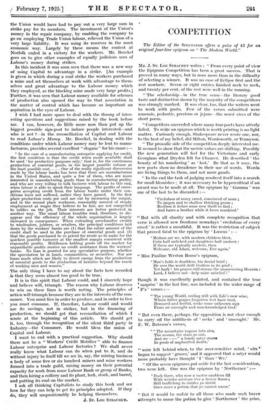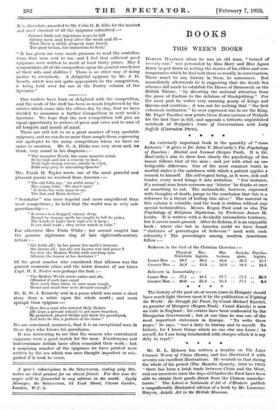COMPETITION
The Editor of the SPECTATOR offers a prize of £5 for an original four-line epigram on " The Modern World."
MR. J. ST. LOE STRACHEY writes : "From every point of view
the Epigram Competition has been a great success. That is proved in many ways, but in none more than in the difficulty of selecting a winner. It was no case of Eclipse first and the rest nowhere. Seven or eight entries finished neck to neck, and twenty per cent. of the rest were well in the running.
"The scholarship—in the true sense—the literary good taste and distinction shown by the majority of the competitors
was strongly marked. It was clear, too, that the writers went to work .with gusto. Few of the verses submitted were anaemic, pedantic, precious or jejune—the worst vices of the short poem.
"Competitors succeeded where many true poets have utterly failed. To write an epigram Which is worth printing is no light matter. Curiously enough, Shakespeare never wrote one, nor, to the best of my belief, did Milton, Wordsworth, or Tennyson.
"The prosodic side of the competition deeply interested me.
It seemed to show that the metric values are shifting. Possibly the new generation will feel for the Victorians and early Georgians what Dryden felt for Chaucer. He described 'the beauty of his numbering' as 'lost.' Be that as it ma's-, the new poets show no decadence in their use of words. Words are living things to them, and not mere gauds.
"In the end the task of judging resolved itself into a search for small blemishes;, it was necessary to be hypercritical if an award was to be made at all. The epigram by ` Gamma' was one of the last to be discarded :—
' Credulous of every creed, convinced of none ; To jargon and to shallow thinking prone ; Restless it itches some new thrill to find ; And hates a brother while it loves mankind.'
"But with all charity and with complete recognition that verse is allowed new freedoms nowadays credulous of every creed' is rather a mouthful. It was the restriction of subject that proved fatal to the epigram by ` Luscus '
Modern are we, with modern children blest, Cubs half unlicked and daughters half undrest : If these are typically modern, then Welcome, old Adam, welcome, Eve again.'
"Miss Pauline Weston Roose's epigram,
'Man's faith is deathless, his denial brief ; He sees the world drift Godless in its grief ; Yet hark ! his prayer still storms the unansworing Heaven : Lord, I believe not—help mine unbelief ! '
though it was excellently pointed, and contained the true 'surprise' in the last line, was included in the wider range of 'F's' verses :— "The young World, reeling still with Life's new wine, Whose bitter grapes forgotten feet have trod, Bemused and 'fretful, seeks some unknown sign From an unsought and unacknowledged God.'
"But even there, perhaps, the opposition is not clear enough to carry off the antithesis of ` seeks ' and 'unsought.' Mr.
F. W. Bateson's verses,
'"The mountains vapour into airs, The moons, the stars go out, And we —" a lonely satyr stares In pools of unplumbed doubt,'
"were left behind when, to the over-sensitive mind, ` airs began to suggest 'graces,' and it appeared that a satyr would 'more probably have thought ` I ' than 'We.'
"Of the seven epigrams put aside for the last consideration, two were left. One was the epigram by ` Northerner ' Dark three, who now a vaster cauldron fill With weirder mixture o'er a fiercer flame ; Still trafficking in riddles ye distill
Once more a potion that ye cannot name.'
"But it would be unfair to all those who made such brave attempts to name the potion to give ` Northerner ' the prize,
It is, therefore, awarded to Mr. Colin D. B. Ellis for the neatest and most classical of all the epigrams submitted :— 'Science finds out ingenious ways to kill
Strong men, and keep alive the weak and ill— That these a sickly progeny may breed, Too poor to tax, too numerous to feed.'
"It has given me very much pleasure to read the contribu- tions that were sent to me, and I feel that sufficient good epigrams were written to merit at least thirty prizes. May I congratulate all of the competitors upon the general excellence of their wits and abilities ? There is no other way of doing justice to everybody. A delightful epigram by Mr. J. D. Newth, which was not quite appropriate to the competition, is being held over for use in the Poetry column of the Spectator."
Our readers have been so delighted with the competition, and the work of the staff has been so much brightened by the entries which came into the offices day by day, that we have decided to announce a further Competition in next week's Spectator. We hope that the new Competition will give an equal opportunity to writers of prose and verse and to men of all tempers and moods of mind.
There are still left to us a great number of 'very quotable epigrams, and we can do no more than sample them, expressing our apologies to the many competitors whom we have no space to mention. Mr. G. A. Hicks was very stern and, we think, very sound in his diagnosis :—
" The wounded World, like some neurotic mind, Seeks high and low a remedy to find ; With high strung nerves, unable to relax, Falls easy prey to unavailing Quacks."
Mrs. Frank H. Taylor wrote one of the most graceful and pleasant poems we received from America :—
"The old folks say, • An awful muss ' ;
The young folks, 'We don't care.' It looks the very same to us,' The Sun and Moon declare."
" Scrutator " was more hopeful and more magnificent than most competitors ; he held that the world was in very safe guardianship :—
" It tosses in a drugged, uneasy sleep,
Bound by strange spe113 far-sought to lull its pain ; The Lords of Light their vigil o'er it keep ; It yet shall wake ; they never watch in vain."
Far otherwise Miss Frida White : her second couplet has the genuine nightmare ring of late eighteenth-century fiction :—
" She holds all : in her power lies earth's increase. She knows all : has she not known war and peace ? See how the Modern World with mocking eyes Affronts the horror of her destinies ! "
Of the great number who considered that idleness was the gravest economic crime and the worst disaster of our times Capt. H. E. Foster was perhaps the best :—
"The Modern World wants cakes and ale, Offended if such fare entail
More work than when, by men more tough, Bread and small beer were deemed enough."
Mr. K. St. J. Kennedy sent in a poem which was more a short story than a satire upon the whole world ; and more epitaph than epigram :—
" Here lies a man who entered Holy Orders
(He kept a private school) to get more boarders.
He preached, played bridge and knew his paradigms,
And here he lies, a pattern of his times."
We are convinced, moreover, that it is an exceptional man in
these days who knows his paradigms.
It was interesting to see that the women who contributed
epigrams were a good match for the men. Pseudonyms and indeterminate initials have often concealed their work : but a surprising number of the epigrams we have printed were Written by the sex which was once thought impudent or mis- guided if it took to verse.











































 Previous page
Previous page